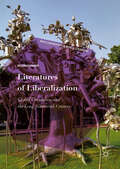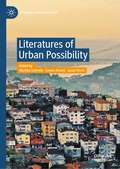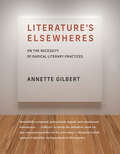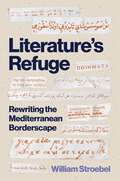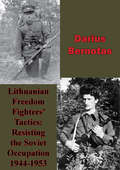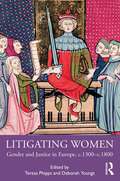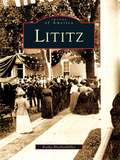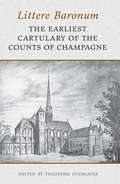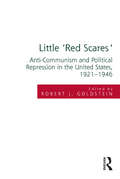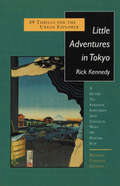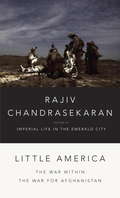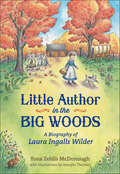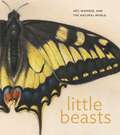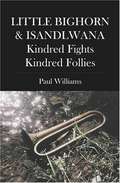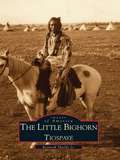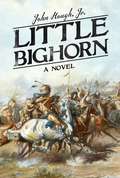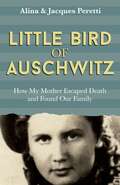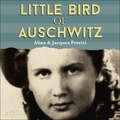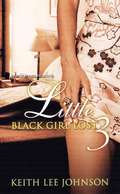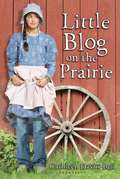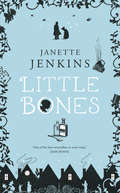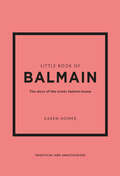- Table View
- List View
Literatures of Liberalization: Global Circulation And The Long Nineteenth Century (New Comparisons In World Literature Series)
by Regenia GagnierThis book traces the global circulation of cultures and ideologies from the technological and democratic revolutions of the long nineteenth century to liberal and neoliberal modernity. Focussing on moments of coerced (colonial and postcolonial) and voluntary contact rather than national boundaries, the author draws attention to the global scope of literatures and geopolitical commodities as actants in world affairs, as in processes of liberalization, democratization, and trade, but also to the distinctiveness of each local environment at its moments of transculturation. Based in extensive experience in collaborative, multilingual, interdisciplinary networks, the book synthesizes existing theoretical scholarship, provides original case studies of world-historical Victorian and modern writers, and articulates a new interdisciplinary methodology for literary studies in a global context. It will be of interest to Victorianists, modernists, comparatists, political theorists, translators, and scholars of world literatures, world ecology, and globalization.
Literatures of Urban Possibility (Literary Urban Studies)
by Lieven Ameel Jason Finch Markku SalmelaThis book demonstrates how city literature addresses questions of possibility. In city literature, ideas of possibility emerge primarily through two perspectives: texts may focus on what is possible for cities, and they may present the urban environment as a site of possibility for individuals or communities. The volume combines reflections on urban possibility from a range of geographical and cultural contexts—in addition to the English-speaking world, individual chapters analyse possible cities and possible urban lives in Turkey, Israel, Finland, Germany, Russia and Sweden. Moreover, by engaging with issues such as city planning, mass housing, gentrification, informal settlements and translocal identities, the book shows imaginative literature at work outlining what possibility means in cities.
Literature’s Elsewheres: On the Necessity of Radical Literary Practices
by Annette GilbertAn examination of a series of diverse, radical, and experimental international works from the 1950s to the present.What is a literary work? In Literature&’s Elsewheres, Annette Gilbert tackles this question by deploying an extended concept of literature, examining a series of diverse, radical, experimental works from the 1950s to the present that occupy the liminal zone between art and literature. These works—by American Artist, Allison Parrish, Natalie Czech, Stephanie Syjuco, Fiona Banner, Elfriede Jelinek, Dan Graham, Robert Barry, George Brecht, and others—represent a pluralized literary practice that imagines a different literature emerging from its elsewheres. Investigating a work&’s coming into being—its transition from &“text&” to &“work&” as a social object and pragmatic category of literary communication—Gilbert probes the assumptions and foundations that underpin literature, including the ideologies and power structures that prop it up. She offers a snapshot from a period of recent literary and art history when such central concepts as originality and authorship were questioned and experimental literary practices ranged from concrete poetry and Oulipo to conceptual writing and appropriation literature. She examines works that are dematerialized, site-specific, unique copies of other works, and institutional critiques. Considering the inequalities, exclusions, and privileges inscribed in literature, she documents the power of experimental literature to attack these norms and challenges the field&’s canonical geographic boundaries by examining artists with roots in North and South America, East Asia, and Western and Eastern Europe. The cross-pollination of literary and art criticism enriches both fields. With Literature&’s Elsewheres, Gilbert explores what art can&’t see about the literary and what literature has overlooked in the arts.
Literature’s Refuge: Rewriting the Mediterranean Borderscape
by William StroebelStories silenced or sequestered by a century of mass displacement between Europe and the Middle East—recovered and retold at lastIn 1923, the Greco-Turkish Population Exchange uprooted and swapped nearly two million Christians and Muslims, &“pacifying&” the so-called Near East through ethnic partition and refugeehood. This imposition of borders not only uprooted peoples from their place in the world; it also displaced many of their stories from a place in world literature. In Literature&’s Refuge, William Stroebel recovers and weaves together work by fugitive writers, oral storytellers, readers, copyists, editors, and translators dispersed by this massive &“unmixing&” of populations and the broader border logic that it set in motion. Stroebel argues that two complementary forces emerged as a template for the Eastern Mediterranean&’s cultural landscape: the modern border, which reshuffled people through a system of filters and checkpoints; and modern philology, which similarly reshuffled their words and works. Philologists and publishers defined modern literature by picking apart, extracting, reformatting, or dispossessing refugee and diasporic texts across a racialized borderscape—a gray zone of semi-inclusion and semi-exclusion, semimobility and immobility.Stroebel reaches into the chinks and crannies of this borderscape to reconstitute the rich textual geography between Greek Orthodoxy and Sunni Islam, between Greek-script, Arabic-script, and Latin-script literary traditions at the edges of Europe and the Middle East. Doing so, he offers a new methodological toolkit for rewriting the modern borderscapes of world literature.
Lithuanian Freedom Fighters' Tactics: Resisting The Soviet Occupation 1944-1953
by Darius BernotasAlthough the end of World War II enabled devastated countries to rebuild and enjoy a time of peace, another bloody war had just started in Lithuania. Lithuanian Freedom Fighters (LFF) fought for almost a decade (1944-1953) against the Soviets who occupied their country after World War II. This research focuses on LFF tactics that enabled them to oppose greatly superior Soviet forces for an extended period of time and on the factors that resulted in eventual defeat of LFF armed resistance. The research utilized the elements of combat power as the measurement criteria to describe the LFF tactics.The author concludes that the LFF tactics were to some extent effective. LFF managed to adapt tactics in accordance with a changing situation in terms of shifting Soviet tactics and wrong initial assumptions regarding international support. The other factor that contributed to the LFF success fighting the superior enemy for almost a decade was related to LFF ability to mitigate LFF combat power elements' weaknesses while exploiting their strengths.Nevertheless, the absence of both political and material international support along with Soviet success in cutting off population support to the LFF were two main reasons that resulted in the gradual defeat of the armed resistance.As asymmetric warfare is likely to continue playing an important role in future conflicts, members of the military profession should find it useful to familiarize themselves with this research. A thorough analysis of LFF tactics employing a combination of regular and irregular warfare to counter superior forces should assist military professionals in further deepening their understanding of asymmetric warfare phenomena thus contributing to their awareness of contemporary operational environment.
Litigating Women: Gender and Justice in Europe, c.1300-c.1800
by Teresa PhippsThis edited collection, written by both established and new researchers, reveals the experiences of litigating women across premodern Europe and captures the current state of research in this ever-growing field. Individually, the chapters offer an insight into the motivations and strategies of women who engaged in legal action in a wide range of courts, from local rural and urban courts, to ecclesiastical courts and the highest jurisdictions of crown and parliament. Collectively, the focus on individual women litigants – rather than how women were defined by legal systems – highlights continuities in their experiences of justice, while also demonstrating the unique and intersecting factors that influenced each woman’s negotiation of the courts. Spanning a broad chronology and a wide range of contexts, these studies also offer a valuable insight into the practices and priorities of the many courts under discussion that goes beyond our focus on women litigants. Drawing on archival research from England, Scotland, Ireland, France, the Low Countries, Central and Eastern Europe, and Scandinavia, Litigating Women is the perfect resource for students and scholars interested in legal studies and gender in medieval and early modern Europe.
Lititz
by Kathy BlankenbillerLititz may be just a speck on the map, but its historical impact is a match for any of the nation's biggest cities. Shaped by history, today Lititz sparkles as the village jewel of Lancaster County. Set against the breathtaking beauty of the surrounding countryside, this little town offers a thriving downtown, slow-paced atmosphere, and abundant recreational areas and cultural events. Lititz is the proud home of Julius Sturgis Pretzel Bakery, the nation's oldest pretzel bakery; Linden Hall, the oldest girls' boarding school in the United States; and the oldest continuous celebration of the Fourth of July. The vintage photographs in Lititz present a rare insider's view of a town of historical firsts in America, and they show why visitors always leave Lititz with the feeling of nostalgia for the hometown of their childhood.
Littere Baronum
by Theodore EvergatesThe cartulary of 1211 is the oldest surviving register produced by the chancery of the counts of Champagne. This first edition of the cartulary contains 121 letters received from the barons and prelates of the county during the rule of Count Thibaut III (1198-1201) and the first decade of the regency of his widow, Countess Blanche (1201-22).They deal primarily with feudal matters--homage, tenure, the construction and rendering of castles--and lordship over property and rural communities. Since only one-third of the original letters survive, the cartulary copies are particularly valuable in capturing the range of written records entering the chancery of a major French principality around 1200.The introduction to the volume traces the evolution of aristocratic letters patent from the 1140s and argues that they were far more important in the twelfth century, both for transactions between laymen and for transactions with religious houses, than historians of medieval diplomacy have allowed. The introduction goes on to discuss the evolution of the chancery in the twelfth century, the creation of a formal chancery archive in the 1190s, and the organization and contents of the cartulary complied in 1211.
Little 'Red Scares': Anti-Communism and Political Repression in the United States, 1921-1946
by Robert Justin GoldsteinAnti-communism has long been a potent force in American politics, capable of gripping both government and popular attention. Nowhere is this more evident that the two great 'red scares' of 1919-20 and 1946-54; the latter generally - if somewhat inaccurately - termed McCarthyism. The interlude between these two major scares has tended to garner less attention, but as this volume makes clear, the lingering effects of 1919-20 and the gathering storm-clouds of 'McCarthyism' were clearly visible throughout the 20s and 30s, even if in a more low-key way. Indeed, the period between the two great red scares was marked by frequent instances of political repression, often justified on anti-communist grounds, at local, state and federal levels. Yet these events have been curiously neglected in the history of American political repression and anti-communism, perhaps because much of the material deals with events scattered in time and space which never reached the intensity of the two great scares. By focusing on this twenty-five year 'interim' period, the essays in this collection bridge the gap between the two high-profile 'red scares' thus offering a much more contextualised and fluid narrative for American anti-communism. In so doing the rationale and motivations for the 'red scares' can be seen as part of an evolving political landscape, rather than as isolated bouts of hysteria exploding onto - and then vanishing from - the political scene. Instead, a much more nuanced appreciation of the conflicting interests and fears of government, politicians, organised labour, free-speech advocates, employers, and the press is offered, which will be of interest to anyone wishing to better understand the political history of modern America.
Little Adventures in Tokyo
by Rick KennedyFrom the old traditions to the trendy and bizarre, here is a discovery guide to the singular delights of Tokyo and a whole new way of having fun in Japan. Wander the streets of the Old City, learn the secrets of pachinko, discover hidden cafes and jazz bars, meditate in a Zen temple. Cross indexed by location and duration.
Little America: The War Within the War for Afghanistan
by Rajiv ChandrasekaranFrom the award-winning author of Imperial Life in the Emerald City, a riveting, intimate account of America's troubled war in Afghanistan. When President Barack Obama ordered the surge of troops and aid to Afghanistan, Washington Post correspondent Rajiv Chandrasekaran followed. He found the effort sabotaged not only by Afghan and Pakistani malfeasance but by infighting and incompetence within the American government: a war cabinet arrested by vicious bickering among top national security aides; diplomats and aid workers who failed to deliver on their grand promises; generals who dispatched troops to the wrong places; and headstrong military leaders who sought a far more expansive campaign than the White House wanted. Through their bungling and quarreling, they wound up squandering the first year of the surge. Chandrasekaran explains how the United States has never understood Afghanistan--and probably never will. During the Cold War, American engineers undertook a massive development project across southern Afghanistan in an attempt to woo the country from Soviet influence. They built dams and irrigation canals, and they established a comfortable residential community known as Little America, with a Western-style school, a coed community pool, and a plush clubhouse--all of which embodied American and Afghan hopes for a bright future and a close relationship. But in the late 1970s--after growing Afghan resistance and a Communist coup--the Americans abandoned the region to warlords and poppy farmers. In one revelatory scene after another, Chandrasekaran follows American efforts to reclaim the very same territory from the Taliban. Along the way, we meet an Army general whose experience as the top military officer in charge of Iraq's Green Zone couldn't prepare him for the bureaucratic knots of Afghanistan, a Marine commander whose desire to charge into remote hamlets conflicted with civilian priorities, and a war-seasoned diplomat frustrated in his push for a scaled-down but long-term American commitment. Their struggles show how Obama's hope of a good war, and the Pentagon's desire for a resounding victory, shriveled on the arid plains of southern Afghanistan. Meticulously reported, hugely revealing, Little America is an unprecedented examination of a failing war--and an eye-opening look at the complex relationship between America and Afghanistan.From the Hardcover edition.
Little Author in the Big Woods: A Biography of Laura Ingalls Wilder
by Yona Zeldis McDonoughMany girls in elementary and middle school fall in love with the Little House books by Laura Ingalls Wilder. What they don't always realize is that Wilder's books are autobiographical. This narrative biography describes more of the details of the young Laura's real life as a young pioneer homesteading with her family on many adventurous journeys. This biography, complete with charming illustrations, points out the differences between the fictional series as well as the many similarities.Yona Zeldis McDonough's Little Author in the Big Woods is a fascinating story of a much-celebrated writer.
Little Beasts: Art, Wonder, and the Natural World
by Alexandra Libby Brooks Rich Stacey SellA richly illustrated look at the intersection of art and science in Renaissance EuropeArt played a pivotal role in the development of natural history during the sixteenth and seventeenth centuries. European colonial expansion enabled naturalists to study previously unknown insects, animals, and other beestjes—&“little beasts&”—from around the globe. Little Beasts explores how artists such as Joris Hoefnagel and Jan van Kessel helped deepen and spread knowledge of these creatures with highly detailed and playful works that inspired generations of printmakers, painters, decorative artists, and naturalists.This appealing book begins by mapping the origins of natural history as a discipline, showing how early illustrated treatises reflected a vibrant exchange between artists and naturalists that contributed to the growth of natural science and sparked public fascination with the animal kingdom. It shares insights into Hoefnagel&’s engagement with contemporary natural history, as demonstrated in his Four Elements—a four-volume series of some three hundred watercolor miniatures of animals—and examines how intaglio printmaking enabled natural history studies to reach new audiences. The volume concludes with a discussion of Van Kessel&’s small oil paintings, likely made for discerning collectors of both natural and artistic curiosities.Blending lively and informative essays with beautiful illustrations, Little Beasts traces the connections between artists, naturalists, and collectors in an age of scientific discovery and broadening horizons, inviting readers to look with wonder at nature&’s variety.Published in association with the National Gallery of Art, Washington, DCExhibition ScheduleNational Gallery of Art, Washington, DCMay 18–November 2, 2025
Little Bighorn & Isandlwana: Kindred Fights, Kindred Follies
by Paul WilliamsIn June of 1876 Custer's 7th Cavalry was savagely defeated in the Montana wilderness during an unprovoked war to seize the Sioux and Cheyenne hunting grounds. Turning former nations regarding the Battle of the Little Bighorn on their head, Paul Williams penetrates Custer's mind, revealing the devastating logic for the fatal regimental division which led to his own death and the annihilation of his immediate command. Three years later the redcoat troops of Queen Victoria launched an equally outrageous grab for Zulu lands in South Africa, and repeated Little Bighorn history at Isandlwana with their own humiliating destruction. Lieutenant Colonel George A. Custer and Lieutenant Colonel Anthony W. Durnford had much in common, from mode of dress to tactics employed, and the way they died. Here are riveting stories of the two soldiers and their final battles are interwoven, revealing how, to an astonishing degree, similar aims, tactics, personalities, weapons, incidents and underestimation of so-called savages led to tragic defeat.
Little Bighorn, Tiospaye, The (Images of America)
by Kenneth Shields Jr.In June of 1876, members of various northern Plains tribes gathered at the Little Bighorn River to form the largest Indian encampment in recorded American history. The huge gathering, called Tiospaye, encompassed over 1,000 lodges housing approximately 7,000 men, women, and children. The over 200 vintage photographs portrayed here represent the weeks just before the infamous Battle of Little Bighorn and the creation of legends. Two major events occurred in June 1876 that would forever alter the course of Native American history. The defeat of Custer and the Seventh Cavalry was the most infamous event, but only the ending to a greater celebration. Offering a portrait of a people at the renaissance of their culture, this new book showcases images of the lifestyle of the encampment and the many brave leaders who fought at Little Bighorn, including Sitting Bull and the author's grandfather, Feather Earring.
Little Bighorn: A Novel
by John Hough Jr.Eighteen year-old Allen Winslow is living what should be every young man’s dream. Thanks to his mother’s charming intercession, he is to ride with the legendary Seventh Cavalry led by Gen. George Custer himself. Traveling west, he meets Addie Grace Lord, whose brother is one of Custer’s regimental surgeons, and the pair falls in love on their journey. As much as Allen wants to make something of himself on the untamed frontier, he soon wants to stay with Addie even more. But neither Allen nor Addie can know where their destinies lie—and neither can foresee the epic events about to tear them asunder. Beautifully written and filled with unforgettable characters both fictional and factual, Little Bighorn brings the American West and its heartbreaking history to life, brilliantly portraying the flawed and tormented Custer.
Little Bird of Auschwitz: How My Mother Escaped Death and Found Our Family
by Jacques Peretti'That nickname . . .''"Little bird." It wasn't mine. I found out later he gave it to every little girl that came in to be injected. "Little Bird" didn't mean anything. It was a trick. There were thousands of "little birds", just like me, all thinking they were the only one.'As a reporter, Jacques Peretti has spent his life investigating important stories. But there was one story, heard in scattered fragments throughout his childhood, that he never thought to investigate. The story of how his mother survived Auschwitz.In the few last months of the Second World War, thirteen-year-old Alina Peretti, along with her mother and sister, was one of thirteen thousand non-Jewish Poles sent to Auschwitz. Her experiences there cast a shadow over the rest of her life.Now ninety, Alina has been diagnosed with dementia. Together, mother and son begin a race against time to record her memories and preserve her family's story. Along the way, Jacques learns long-hidden secrets about his mother's family. He gains an understanding of his mother through retracing her past, learning more about the woman who would never let him call her 'Mum'.
Little Bird of Auschwitz: How My Mother Escaped Death and Found Our Family
by Jacques Peretti'That nickname . . .''"Little bird." It wasn't mine. I found out later he gave it to every little girl that came in to be injected. "Little Bird" didn't mean anything. It was a trick. There were thousands of "little birds", just like me, all thinking they were the only one.'As a reporter, Jacques Peretti has spent his life investigating important stories. But there was one story, heard in scattered fragments throughout his childhood, that he never thought to investigate. The story of how his mother survived Auschwitz.In the few last months of the Second World War, thirteen-year-old Alina Peretti, along with her mother and sister, was one of thirteen thousand non-Jewish Poles sent to Auschwitz. Her experiences there cast a shadow over the rest of her life.Now ninety, Alina has been diagnosed with dementia. Together, mother and son begin a race against time to record her memories and preserve her family's story. Along the way, Jacques learns long-hidden secrets about his mother's family. He gains an understanding of his mother through retracing her past, learning more about the woman who would never let him call her 'Mum'.(P) 2022 Hodder & Stoughton Limited
Little Bird of Auschwitz: How My Mother Escaped Death and Found Our Family
by Jacques Peretti'That nickname . . .''"Little bird." It wasn't mine. I found out later he gave it to every little girl that came in to be injected. "Little Bird" didn't mean anything. It was a trick. There were thousands of "little birds", just like me, all thinking they were the only one.'As a reporter, Jacques Peretti has spent his life investigating important stories. But there was one story, heard in scattered fragments throughout his childhood, that he never thought to investigate. The story of how his mother survived Auschwitz.In the few last months of the Second World War, thirteen-year-old Alina Peretti, along with her mother and sister, was one of thirteen thousand non-Jewish Poles sent to Auschwitz. Her experiences there cast a shadow over the rest of her life.Now ninety, Alina has been diagnosed with dementia. Together, mother and son begin a race against time to record her memories and preserve her family's story. Along the way, Jacques learns long-hidden secrets about his mother's family. He gains an understanding of his mother through retracing her past, learning more about the woman who would never let him call her 'Mum'.
Little Black Girl Lost
by Keith Lee JohnsonJohnnie Wise was just fifteen years old when her mother sold her virginity to an unscrupulous white insurance man named Earl Shamus. Stunningly beautiful, with long naturally wavy black hair, she possessed the voluptuous body of a thirty-year-old woman. Her skin was the color of brown sugar. Johnnie had heard about Earl Shamus and his escapades among the poor black women in New Orleans. But what she didn't know was that Shamus had quietly made several of the girls in their neighborhood his reluctant concubines when their youthful bodies ripened--she was next. Enter 1950's New Orleans, a world of betrayal, envy, lust and murder, where everyone has ulterior motives. Take a peek at Johnnie Wise, a 15-year-old girl, being pursued by ruthless crime boss, Napoleon Bentley, who will stop at nothing to have this young beauty. Little Black Girl Lost will shock you right up to the very end with its revealing truths.
Little Black Girl Lost 3: Ill Gotten Gains
by Keith Lee JohnsonThe past resurfaces in the third instalment of the life and times of 17-year-old Johnnie Wise. Truth has its consequences and Johnnie has a lot to answer for - the innocent girl from the first tale is gone and all that remains is the self-absorbed, self-righteous courtesan who is now complicit in three murders. Keith Lee Johnson takes readers back to 1950s New Orleans and into a world of betrayal, envy, lust and murder where everyone has ulterior motives.
Little Black Girl Lost 4: The Diary of Josephine Baptiste
by Keith Lee JohnsonFans of the Little Black Girl Lost series have become fascinated by the complex character of Johnnie Wise. In this fourth installment of the series, author Keith Lee Johnson takes us all the way back to the beginning, to the root of Johnnie's family tree ... In an African village, a beautiful 16-year-old girl is preparing to wed a much older man, but her heart belongs to his younger brother. Determined to be together, she and her young lover run away on the night before the arranged marriage is to take place. They have no idea that this is the last time they will ever see their families, their friends, or their beloved country. Before they can consummate their relationship, they are captured and brought on board a Dutch slave ship headed for the Americas. The young woman awakes in a new place, where she is given a new name. She is sold to a wealthy New Orleans plantation owner with some very peculiar tastes. Will she find a way to be reunited with her lover, or discover that lust, lies, and murder are a new way of life to which she must adapt?
Little Blog on the Prairie
by Cathleen Davitt BellThirteen-year-old Genevieve's summer at a frontier family history camp in Laramie, Wyoming, with her parents and brother is filled with surprises, which she reports to friends back home on the cell phone she sneaked in, and which they turn into a blog.
Little Bones
by Janette JenkinsIt's 1899 and a young girl is abandoned in London by her feckless family. She finds lodging and work assisting a doctor. But Jane Stretch is no ordinary girl, and Mr Swift is no ordinary doctor.Jane does her best to keep up with the doctor, her twisted bones throbbing, as they hurry past the markets, stage doors and side shows to appointments in certain boarding houses across town. The young actresses who live there have problems, and Mr Swift does what is required, calmly and discreetly. Grateful to her benefactor and his wife, Jane assists him and asks no questions - the desperate women not minding that it is a cripple girl who wipes their brows.When this unlikely pair becomes involved with Johnny Treble, a rakish music hall star, and the police come knocking, it seems that Jane's spell of good fortune is unlikely to last...
Little Book of Balmain: The story of the iconic fashion house (Little Book Of Fashion Ser.)
by Karen Homer"Good fashion is evolution, not revolution" – Pierre BalmainOne of the original big Parisian couture houses, alongside the likes of Dior and Chanel, Pierre Balmain reigned supreme over the 1950s fashion world with his spectacular and intricate evening wear.Now, in the twenty-first century, Balmain's ultra-modern look – still with the spirit of Pierre – is worn by the likes of Beyoncé, Kristen Stewart, Kate Moss and Kendall Jenner. Heavily embellished, dazzling detail meets futuristic silhouettes for an instantly recognisable look.Known for their strong social media presence driven by their "Balmain army" of fans, Balmain holds a unique position among the top couture houses today.
